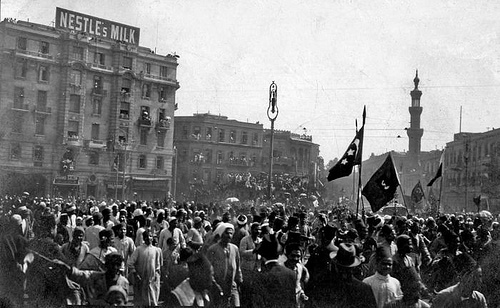 |
| Egyptian Revolution (1919) |
The revolution in Egypt broke out in March 1919 after the British arrested Sa'd Zaghlul, the leader of the Wafd Party, the main Egyptian nationalist party, and several other Wafdists. They were then deported to Malta. The exile of these popular leaders led to student demonstrations that soon escalated into massive strikes by students, government officials, professionals, women, and transport workers.
Nationalist discontent had been fueled by the protectorate established by the British at the beginning of the war, wartime shortages of basic goods, increased prices, the forced conscription of peasants as laborers for the military, and the presence of huge numbers of Western soldiers in Egypt.
Within a week all of Egypt was paralyzed by general strikes and rioting. Violence resulted, with many Egyptians and Europeans killed or injured when the British attempted to crush the demonstrations. European quarters and citizens were attacked by angry crowds who hated the special privileges and economic benefits given to foreigners.
  |
Rail and telegraph lines were cut, and students refused to attend classes. Zaghlul had worked hard in the weeks prior to his arrest to mold the Wafd into an efficient political party. He traveled around the countryside gathering support and collecting money. In spite of martial law, which was imposed by the British at the beginning of the war, large-scale public meetings were held.
In his absence Zaghlul's wife, Safia, played a key role in party politics. Led by Safia and Huda Shaarawi, upper-class Egyptian women staged a political march through the streets of Cairo, throwing off their veils, waving banners, and shouting nationalist slogans.
Wafdist cells throughout the country coordinated the demonstrations and strikes through a central committee chain of command. Religious leaders, especially the sheikhs at al-Azhar, the premier Muslim university, also participated.
Propaganda leaflets, posters, and postcards with pictures of Sa'd and Safia Zaghlul were distributed throughout the country. The Wafd's central committee maintained an active role within unions, student groups, and professional organizations.
Determined to maintain control over Egypt, the British government replaced High Commissioner Reginald Wingate, who was considered weak and too moderate, with General Edmund Allenby, the greatest British hero from World War I.
Allenby promptly met with leading Egyptians, who convinced him that the only way to restore order was to release the Wafd leaders. A realist, Allenby complied and permitted Zaghlul and others to travel to Paris.
The Wafd kept up the pressure in Egypt, organizing boycotts of British goods and refusing to meet with the Milner Mission that had been sent out from London to investigate the situation. Steps were taken for more economic independence, and Talat Harb established an Egyptian bank in 1920.
Negotiations were held between the Wafd and the British in London in 1920, but the Wafd failed to secure a withdrawal of British troops, the end of the protectorate or the capitulations (favored status granted to foreign residents), or full independence. Nevertheless, the Wafd leaders were greeted as heroes when they returned home. When Zaghlul was again arrested and deported in 1921, a new wave of nationalist demonstrations erupted.
In light of the determined nationalist movement, Allenby forced a reluctant foreign office to end the protectorate, and in 1922 the British unilaterally declared Egyptian independence under a constitutional monarchy led by King Fu'ad.
However, Britain retained widespread powers, including the stationing of troops in Egypt and a role in determining Egyptian foreign affairs as well as control over the Sudan. Consequently, Egyptian nationalists continued in opposition to Britain throughout the interwar years.